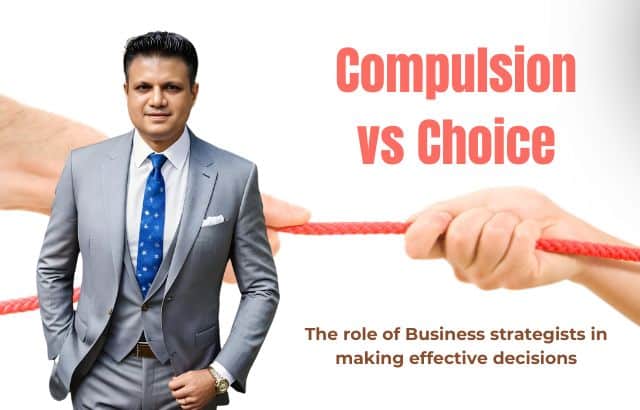When it comes to decision-making, there are two critical concepts that influence our actions: compulsion and choice. These terms define how we approach situations and make decisions in various aspects of life, particularly in business. Let’s explore the difference between compulsion and choice, the importance of these concepts for a strategist, and how they play out in real-world scenarios.
Table of Contents
What is Compulsion?

Compulsion refers to actions or decisions that are driven by external forces or internal pressures, often leaving little room for freedom of choice. When someone is compelled to act, they do so out of necessity, urgency, or obligation, rather than a desire or preference. These actions are usually influenced by rules, circumstances, or the need to avoid negative consequences.
Example: Imagine a business leader who is forced to lay off employees due to financial constraints. The decision is not a result of personal desire but rather a compulsion driven by the economic reality the business is facing.
What is Choice?

Choice, on the other hand, is the ability to make decisions based on personal preference, values, or strategies. In contrast to compulsion, choice allows for flexibility, exploration, and creativity. It is about having multiple options and the freedom to decide what course of action to take.
Example: Consider a startup entrepreneur who chooses to expand their business into a new market based on research, personal interest, and a clear strategy for growth. Here, the decision is driven by opportunity and foresight, rather than external forces.
The Role of a Strategist in Navigating Compulsion and Choice
A business strategist plays a pivotal role in navigating between compulsion and choice. Strategists are responsible for making decisions that steer businesses toward success, even in challenging circumstances. They identify opportunities, create plans, and anticipate potential problems to ensure that decisions made are in the best interest of the business.
Key Roles of a Business Strategist:
1. Identifying Opportunities:
Strategists help businesses shift from compelled actions (like cutting costs or downsizing) to more strategic choices (such as investing in innovation or diversifying offerings).
Example: During an economic downturn, a strategist may identify a gap in the market for a new product and recommend that the company pivot to capitalize on this opportunity, instead of simply reducing expenses.
2. Anticipating Risks and Rewards:
Strategists predict potential outcomes and guide organizations to make choices that balance risk with reward. They understand when to act out of compulsion and when to make calculated choices.
Example: A strategist in a tech company might advise delaying the launch of a new product until market conditions improve, rather than feeling compelled to go ahead with the launch simply because competitors are doing so.
3. Long-Term Vision and Flexibility:
Business strategists help leaders choose paths that align with long-term goals, even when faced with short-term pressures. They assist in finding creative solutions that offer freedom of choice, rather than forcing decisions based on immediate circumstances.
Example: A strategist might guide a company to invest in employee training programs as a long-term investment in talent, rather than laying off workers to reduce costs, which could harm the business in the future.
Real-Life Examples of Compulsion vs. Choice in Business Strategy
Compulsion Example:

A retail chain facing declining sales might be compelled to cut back on inventory or shut down stores. These decisions might be made out of necessity to avoid financial collapse. However, these actions may only provide short-term relief.
Choice Example:

The same retail chain could also choose to diversify by investing in an online platform, offering more personalized customer service, or entering a new market segment. This decision is based on a calculated strategy, aiming for long-term growth.
Frequently Asked Questions (FAQs)

Q1: How can a business strategist balance compulsion and choice?
A business strategist must understand the pressures and external factors influencing the business (compulsion) while also looking for creative opportunities and options (choice). They analyze data, trends, and long-term goals to make the best decision.
Q2: Can a compulsion ever be a good thing in business?
Yes, sometimes compulsion forces businesses to make necessary adjustments or react to urgent circumstances. For example, during a crisis, quick decisions such as cutting costs or reshaping the business model might be crucial for survival.
Q3: How does a strategist help a company make the best choice?
A strategist conducts thorough market research, analyzes industry trends, assesses risks, and uses predictive modeling to guide business leaders toward choices that will lead to sustainable growth and profitability.
Q4: What role does data play in business decisions between compulsion and choice?
Data plays a crucial role in transforming decisions from compelled actions to strategic choices. Through data analysis, strategists can spot opportunities, forecast risks, and make informed decisions rather than reacting impulsively.
Simple Calculations in Business Strategy

To better understand the difference between compelled actions and strategic choices, let’s look at some basic calculations a strategist might use to make informed decisions:
Cost-Benefit Analysis (Choice):
- Investment in New Product Launch: $100,000
- Projected Revenue from Product: $300,000
- Net Profit: $300,000 – $100,000 = $200,000 (A strategic choice that brings long-term growth).
Short-Term Savings through Cost-Cutting (Compulsion):
- Layoff Costs (Severance): $50,000
- Savings from Reduced Payroll: $80,000
- Net Short-Term Benefit: $80,000 – $50,000 = $30,000 (A quick fix, but may hurt employee morale and productivity).
In this case, the strategist may weigh these options, considering both the immediate savings and the potential long-term impact on company culture and innovation.
Conclusion: Understanding Compulsion and Choice
In the world of business, understanding the difference between compulsion and choice is key to making strategic decisions. While compulsion might drive businesses to act quickly or out of necessity, choice allows room for calculated, long-term strategies that promote growth and sustainability. Business strategists, like Hirav Shah, play a crucial role in guiding companies through both compelled actions and opportunities, ensuring that decisions are informed, balanced, and aligned with overarching goals.











